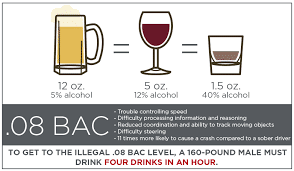Per Se Driving While Intoxicated DWI Offenses in New Jersey
What a Per Se Violation of NJ DWI Laws Means if You’re Arrested

Resource: CDC
New Jersey law prohibits driving while intoxicated, which means driving when you are unable to operate a motor vehicle as well as a sober person under similar circumstances. Although police officers and prosecutors can attempt to prove that you were driving while intoxicated based on your external signs and symptoms of alcohol or drug impairment—as typically evidenced by your performance on a set of field sobriety tests or your refusal to submit to a required chemical test of your blood alcohol concentration—the most common way of proving a DWI offense is through a “per se” blood alcohol test result, as discussed below. While this article provides a general explanation of what it means to be charged with a per se DWI offense, you should speak with a knowledgeable attorney about your specific situation to find out how the law applies in your case. Call (201)-556-1570 now for a free consultation with a knowledgeable New Jersey DWI Lawyer at our firm. A member of our team is available immediately to assist you.
Per Se .08 Blood Alcohol Limit in New Jersey
New Jersey law imposes penalties on drivers if a chemical test confirms that they had a blood alcohol concentration of .08 or more at the time of driving, regardless of whether they were driving poorly at the time. This is known as a “per se” DWI—meaning that all drivers who register a .08 or more BAC reading at the time of driving are per se driving while intoxicated (alternatively referred to as driving under the influence or “DUI”), even if they performed field sobriety tests flawlessly or were pulled over for something as simple as an expired registration tag or tinted windows.
How Police and Prosecutors Prove a Per Se DWI
If a police offer suspects you of drunk driving—often if they see you driving poorly, weaving in and out of traffic lanes, failing to turn on your headlights at night, running a red light, ignoring a stop sign, or causing a traffic collision—that officer may pull you over and ask you a number of preliminary investigatory questions to establish whether they have probable cause to arrest you for DWI and subsequently test your blood alcohol level.
If you show external signs and symptoms of impairment during this initial period of questioning, or if you perform poorly on a commonly administered eye test in which you are instructed to follow a pen or flashlight with your eyes while the officer observes how your eyes react to that stimulus, the officer may ask you to submit to additional field sobriety tests or arrest you and request a chemical test sample from you.
Chemical Tests used as Evidence of Impaired Driving
New Jersey law requires drivers arrested for DWI to provide a chemical test sample upon request. The three most common chemical tests are breath tests, blood tests, and urine tests, in that order. If you refuse to take a chemical test after you are arrested for a DWI, that refusal can be used against you in court and you may be subject to stiff administrative penalties, including extended and automatic driver’s license suspension.
If you provide a breath, blood, or urine sample and that sample, when tested by a trained operator using special testing equipment (most commonly the Alcotest breathalyzer machine), reveals that you were driving with .08 or more BAC, a court or jury can find you guilty of driving while intoxicated, regardless of how well or how poorly you were driving or whether you subjectively felt impaired. In short, if your test comes back at over .08 BAC, you were per se driving while intoxicated and will face severe penalties.
Other Per Se DWI Laws in New Jersey
New Jersey law also applies stiffer per se penalties on individuals who are determined to have had a BAC of .10 or greater at the time of driving. Law enforcement uses the same methods described above to secure a .10 BAC per se DWI conviction, but the penalties associated with that alcohol level are more severe. New Jersey also imposes a per se DWI limit of .01 BAC on individuals who are under 21. So, for example, if a twenty-year-old is arrested and blows a .03 BAC on a breathalyzer machine, that twenty-year-old can be convicted of a per se underage DWI offense, whereas a twenty-one-year-old would not be subject to per se legal liability with the same BAC reading.
Have Questions about New Jersey DWI Laws?
If you have DWI charges pending in New Jersey, get the answers you need today from an experienced DUI attorney at The Tormey Law Firm. Knowing what your arrest could mean and understanding some of the ways you can defend against drunk driving charges to avoid a conviction is a vital step toward protecting your future. Contact our firm now at

